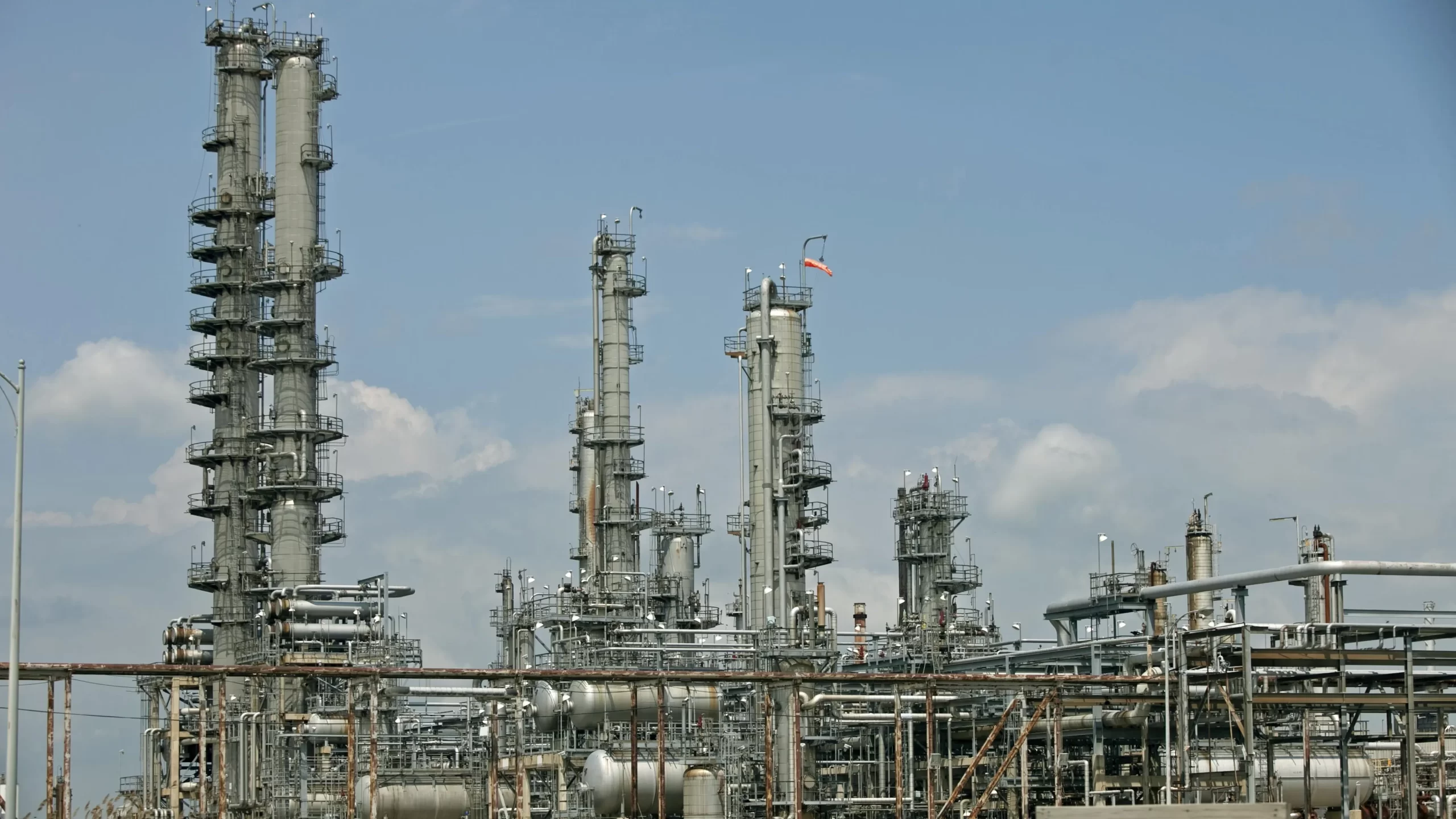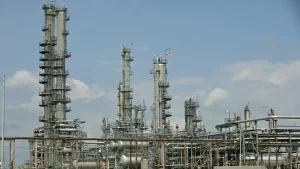
PHILADELPHIA, PA (Friday, April 11) – Yesterday, Clean Air Council filed a Dispute of the termination of a Environmental Protection Agency (EPA) grant which would have enabled the Council to respond to health concerns of Delaware City, DE communities by providing concrete services. The $490,912 Environmental Justice Collaborative Problem Solving (CPS) Cooperative Agreement grant was meant to establish air quality monitoring and help organize communities to study and protect themselves from air pollution emissions from the Delaware City Refinery.
On March 12, 2025, EPA notified the Council in a form letter that EPA had terminated the CPS grant without specifying which of several factors allegedly applied. The letter stated only that the grant allegedly:
“provides funding for programs that promote or take part in DEI initiatives or environmental justice initiatives or other initiatives that conflict with the Agency’s policy of prioritizing merit, fairness, and excellence in performing our statutory functions; that are not free from fraud, abuse, waste, or duplication; or that otherwise fail to serve the best interests of the United States. The grant is therefore inconsistent with, and no longer effectuates, Agency priorities.”
Approximately 400 federal grants around the country were similarly terminated.
“We are disputing this unlawful decision because we remain committed to fighting for the Delaware City communities served through this grant,” said Alex Bomstein, Clean Air Council Executive Director. “The communities around the Refinery have long endured health, economic, and social harms from the Refinery’s air pollution emissions, and we will do everything in our power to continue to advocate for their rights to clean air, pure water, and a livable climate despite our grant being wrongly terminated.”
The grant, welcomed by the community, promised to provide the following: (1) setting up air quality monitors; (2) analyzing the data with community members; (3) assisting in community organizing; and (4) helping residents and community organizations to develop emergency response plans in case of an emergency caused by the Refinery, such as an accident causing a sudden large release of toxic air pollution.

In celebration of Earth Day, Clean Air Council will be tabling and/or in attendance at the following events. We hope to see you there!
Environatal Day at Bartram’s Garden | April 17th 10-2pm
Join Nature Momz at Bartram’s Garden for an organized group walk along the trail to discuss maternal health, air quality, and the impact of the environment on mothers and infants. Free to all and no registration is required.
In partnership with the Philadelphia Regional Center for Children’s Environmental Health, Clear Air Council, Nurturely and a Place for Ummi Maternity Care.
Spring Fest at Bartram’s Garden | April 19th 10-2pm
Join Bartram’s Garden for their annual spring celebration! Activities will include a guided tour of the Garden’s 19th-century flower garden, a youth-led block printing activity, hands-on natural dye activity, an annual plant sale, and so much more. Clean Air Council will be tabling at the event, so stop by to learn more about the smoke contamination issue at Bartram’s Garden.
SEPTA’s Earth Day Celebration | April 21st 11-2pm
SEPTAs Sustainability Department is hosting its annual Earth Day Expo. Check out SEPTAs Zero Emission Fuel Cell buses, learn more about SEPTA’s sustainability practices, and visit Clean Air Councils table to learn more about our transportation programs.
Earth Day Expo at Temple University | April 22nd 11-3pm
Join the Office of Sustainability and TSG Sustainability Committee for an Earth Day Expo to learn more about sustainability on campus through student involvement, departmental research, and action plan development. Clean Air Council will be tabling at the Expo, so stop by to learn more about the Council’s transportation programs.
Swissvale Community Garden Earth Day Cleanup | April 22nd 6-8pm
Join the Swissvale Community Garden to help clean out garden beds and prepare for the growing season. Clean Air Council organizers will be in attendance to discuss our composting program and how to start composting.
Mt. Lebanon Earth Day Event 2025 | April 27th 11-3pm
Join us for live music, vendors, henna art, yoga classes, a kids bike course, and so much more at the Mt. Lebanon Earth Day Event. Stop by Clean Air Councils table to learn more about our programs in Southwest Pennsylvania.

PHILADELPHIA, PA (March 12, 2025) Today, Clean Air Council received notice that our EPA grant to monitor air quality and protect residents from harmful pollution from the Delaware City Refinery (DCR) in Delaware City, DE was terminated. The project works to reduce health conditions like asthma and cancer that can be caused by air pollution from the DCR while also establishing a community-driven disaster response network in the neighborhoods surrounding the DCR in all directions, which could prevent potential harm to the health and safety of residents. The rationale EPA provided for canceling this funding is that it is inconsistent with agency priorities to support “programs or organizations that promote or take part in diversity, equity, and inclusion (“DEI”) initiatives” or “environmental justice initiatives.
Clean Air Council Executive Director Alex Bomstein issued the following statement:
“Environmental justice initiatives are critical to ensuring that everyone, regardless of their race, income, or background, has equal access to a clean and healthy environment. The termination of this program will have real life impacts for those in Delaware City being exposed to harmful pollution every day. Despite this termination notice, we are doing everything we can to continue this fight for Delaware City and all the communities we serve.”
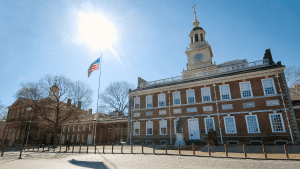
September 9, 2024
PHILADELPHIA, PA On Friday, after three years of requests and two years of litigation, the Federal District Court for the Eastern District of Pennsylvania ordered the National Park Service (NPS) to disclose to Clean Air Council key documents relating to the proposed federal investment in fossil fuel-fired heating equipment for buildings at Independence National Historical Park. The Council brought the lawsuit in 2022 to compel the federal government to produce documents in response to its Freedom of Information Act (FOIA) request.
This effort has been part of the longstanding campaign of the Council and partners to get Philadelphia Gas Works (PGW) to halt its drive to build more long-term methane gas infrastructure during the climate crisis. A diversification study was conducted in December 2021 presenting PGW with multiple options to convert Philadelphia to renewable energy.
“The power of sunshine laws, like the FOIA, allow us, the People, to make sure our government sincerely and correctly upholds laws that exist to protect the environment and public health,” said Lauren Otero, Clean Air Council staff attorney. “Federal decisions to lock itself into fossil fuel infrastructure for decades to come contradicts the Biden administration’s mandate to preserve a stable climate and undercuts our overdue need to reduce carbon emissions.”
NPS has 45 days to turn over to the Council feasibility studies and associated documents that claim gas-fired boilers are the best solution available to reduce carbon emissions. If NPS says it can’t separate out those materials from confidential or proprietary information, it will give them to the Court to review and then decide what to disclose.
“Given the climate crisis, new fossil-fuel heating is wrong for the City and wrong for the planet,” said Elaine Fultz, a member of Citizens’ Climate Lobby’s Philadelphia Chapter. “It would exacerbate global warming, worsen air quality in the Old City neighborhoods, and undercut both City and Federal targets for reducing carbon emissions. Philadelphia Gas Works must transition to the distribution of clean energy, and Philadelphia’s National Historical Park should be a leader, not a laggard, in the green transition.”
For a copy of the opinion, click here
For a copy of the order, click here.
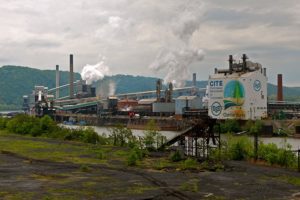
U.S. Steel has permanently shut down Battery 15 and applied for tighter limits on pollution linked to asthma
PITTSBURGH (June 4, 2024) – U.S. Steel has permanently shut down coke Battery 15, one of the oldest and most-polluting parts of the Clairton Coke Works, and has formally applied to the Allegheny County Health Department to remove the battery from its Clean Air Act permits. The closure of Battery 15, which had previously been temporarily idled, will permanently ratchet down emissions of harmful emissions such as sulfur compounds (linked to asthma and respiratory problems), benzene (linked to cancer), and fine particulates (linked to cardiovascular and other health problems). At the time of its closure, Battery 15 contained more than 10% of the remaining coke ovens at Clairton Works. The closure was confirmed in a filing with the Allegheny County Health Department on May 30, 2024.
That filing also includes an application by U.S. Steel to tighten the limit on emissions of hydrogen sulfide (a respiratory irritant), reducing the allowable limit nearly 30% from 35 to 25 grains per cubic foot of gas facility-wide.
Both of these changes were required under the terms of the historic settlement of federal Clean Air Act litigation by PennEnvironment, the Clean Air Council and Allegheny County. The lawsuit was filed in response to thousands of violations of air pollution limits after the massive fire at U.S. Steel’s Clairton Coke Works on Christmas Eve, 2018.
Zachary Barber, the Clean Air Advocate with PennEnvironment, issued the following statement:
“Pittsburghers can breathe a little easier with the news that Allegheny County’s most-toxic polluter, the Clairton Coke Works, has permanently reduced its emissions of harmful air pollutants. Tightening pollution limits for hydrogen sulfide gas and requiring the permanent closure of one of the dirtiest parts of the Clairton Coke Works will pay public health dividends to local residents for years to come.”
Alex Bomstein, the Executive Director of Clean Air Council, issued the following statement:
“When we sued U.S. Steel, our number one priority was protecting the health of residents in the Mon Valley. The closure of Battery 15 was one of the most important steps toward that goal that we achieved in our historic legal victory over U.S. Steel. While nothing can undo the damage caused by U.S. Steel’s previous emissions, these reductions will reduce future harm and move the region toward the cleaner, more wholesome air it deserves.”
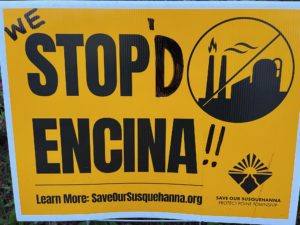
The Texas-based corporation Encina announced on April 18, 2024 that it was withdrawing its plan to develop a toxic plastics chemical recycling plant along the banks of the Susquehanna River in Point Township, Northumberland County.
The facility would have been the largest of its kind in the United States and intended to use extreme heat pyrolysis and refining processes to turn post-consumer plastic waste into benzene, a known carcinogen, xylene, and toluene. These chemicals were then to be shipped by rail, raising major air quality and safety concerns. The facility, proposed to be built in a floodplain along the West branch of the Susquehanna River, would have withdrawn 2.9 million gallons of water from the river per day, raising huge concerns about PFAS, microplastics, and other sources of contamination to a vital source of drinking water.
Encina’s permitting process was plagued with denials and deficiency letters. In March 2023, the Point Township Zoning Board unanimously rejected Encina’s application for a variance to build the facility above the height allowed for the site. In October 2023, Encina withdrew its application for a National Pollutant Discharge Elimination System (NPDES) permit after receiving a second technical deficiency letter. Community opposition culminated on April 2, 2024, when Northumberland Borough Council, which is the neighboring municipality, unanimously passed a resolution opposing the Encina facility.
Community opposition arose immediately after the facility was first announced in 2022. Residents came together to form the group, Save Our Susquehanna (SOS). Community members met with their local officials, attended municipal and county council meetings, canvassed their neighbors, and wrote letters to the editor to the local newspaper. The Council worked with SOS members to review permit applications and flag deficiencies for regulatory departments.
In a tremendous display of community power, Northumberland County residents have shown that the chemical recycling and plastics industries are not welcome in Pennsylvania. However, the fight isn’t over. Encina has been defeated, but it was part of a rapid expansion of pyrolysis and “advanced recycling” facilities that are part of a larger industry-led greenwashing effort to rebrand plastic as sustainable. This is unproven technology: many existing facilities are not economically viable and have been plagued by environmental and safety disasters. Yet we know the industry will keep trying to bring these false solutions to our communities. The Council will continue working with the community group Save our Susquehanna to monitor potential developments and to envision alternatives for a truly sustainable future.
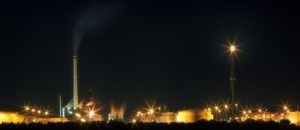
WYALUSING, Pa. — Late Friday, in response to data requests from the Federal Energy Regulatory Commission (FERC), Delaware River Partners and Bradford County Real Estate Partners confirmed that they do not intend to cancel their Wyalusing liquefaction facility and Gibbstown export facility, despite the U.S. Department of Transportation decision last September to suspend authorization to transport LNG by rail car. The Wyalusing and Gibbstown facilities are part of a logistically and financially connected LNG export project contemplated by New Fortress Energy.
If constructed, the Fortress LNG export project will transport explosive LNG by truck, including through the densely-populated, environmental justice communities in eastern Pennsylvania and western New Jersey between Wyalusing, PA and Gibbstown, NJ for export overseas. The Wyalusing liquefaction facility will emit more than a million tons of climate-polluting greenhouse gases and hundreds of tons of toxic air pollutants each year.
The Sierra Club, Clean Air Council, and PennFuture successfully sued to halt construction on the Wyalusing facility in March 2022. Later that year, the Sierra Club and Natural Resources Defense Council filed a petition for a declaratory order urging FERC to exercise oversight over the Fortress LNG export project.
In response, the Sierra Club, Clean Air Council, and PennFuture issued the following statements:
“By continuing to pursue this dangerous LNG export project, Delaware River Partners, Bradford County Real Estate Partners, and New Fortress Energy are putting the lives of millions of Pennsylvanians and New Jerseyans at risk,” said Patrick Grenter, Sierra Club Beyond Dirty Fuels Campaign director. “The last thing we need is even more dangerous methane gas extracted from Pennsylvania, shipped through our communities by truck, and exported overseas — all while residents face worsening illnesses, higher healthcare costs, and increased energy bills caused by gas exports. This decision is unnecessary and reckless, and the Sierra Club is prepared to continue fighting this project until it is officially canceled.”
“The proposed scheme to make liquified natural gas in Northern Pennsylvania, ship it through our communities for hundreds of miles, and then export it to overseas markets from a facility on the shore of the Delaware River is absurd at best and deadly at worst,” adds Abigail M. Jones, Vice President of Legal and Policy at PennFuture. “Despite continued losses that prove just how unworkable this scheme is, these companies are now doubling down on a plan to deliver highly explosive LNG through some of Pennsylvania’s most vulnerable communities via trucks. Pennsylvanians will not benefit from this plan. We do not need more fossil fuel development; we need to focus our economic development priorities on the future: clean, renewable energy and green, sustainable industries.”
“The Wyalusing and Gibbstown LNG facilities promise to lock us into dirty air and millions of tons of climate-heating pollution for decades while raising energy prices at home,” said Alex Bomstein, Clean Air Council Executive Director. “This ill-conceived proposal has no place in our Pennsylvania and New Jersey communities. We will never stop fighting these dirty and dangerous LNG facilities.”
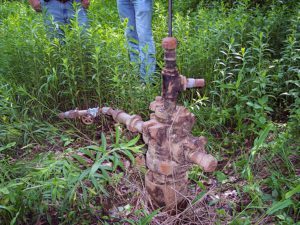
PENNSYLVANIA (April 22, 2024) – Last week, the federal government finalized a significant rule that increases minimum bonding amounts from $10,000 to $150,000 per oil and gas lease on federal land. Well bond amounts are the money that drilling companies have to put aside for eventual cleanup and plugging before being allowed to drill a new well. However, when bond amounts are less than the actual cost of plugging, taxpayers are left responsible for cleanup costs when companies go out of business and abandon their well. With over 130,000 documented orphaned wells in the United States polluting the environment and harming community health—and new wells being drilled every day without adequate bonding—this increase was long overdue.
“In raising federal lease bond amounts to reflect actual cleanup costs, the federal government is taking an important step to protect both taxpayers and the environment,” said Alex Bomstein, Executive Director of the Clean Air Council. “But while the rest of the country moves forward, Pennsylvania has regressed. In 2022, the Pennsylvania legislature passed Act 96, which capped the bond amount for conventional wells at a pittance of $2,500 per well, far below the actual cost. To protect Pennsylvanians, the Council and our partners are pursuing a joint lawsuit asking the court to rule Act 96 unconstitutional under the Environmental Rights Amendment. The federal government’s decision this month underscores how Pennsylvania’s well bonding system is broken and sacrifices community health and taxpayer dollars.”
“In updating its bonding amount, BLM is acknowledging that the current amount established more than 60 years ago was insufficient to cover the costs of cleaning up abandoned wells. This will save taxpayers from the burden of reclaiming wells after oil and gas companies neglect to clean up their polluting mess. This change reflects the reality of how expensive it is to protect people’s health and the environment from abandoned wells. We’re just asking Pennsylvania leaders to reach the same commonsense conclusions,” said Kelsey Krepps, Senior Field Organizer at Sierra Club.

WASHINGTON (April 10, 2024) –Yesterday, a D.C. Circuit panel unanimously dismissed and rejected challenges to the U.S. Environmental Protection Agency’s (EPA) decision to reinstate its waiver to California’s Advanced Clean Car Program.
“Emissions from the transportation sector need to be eliminated to achieve our climate and public health goals. We commend the decision, which upholds California’s ability, under the Clean Air Act, to reduce emissions and protect public health and the climate through its Advanced Clean Car Program,” said Veronica Saltzman, an attorney at Clean Air Task Force (CATF). “California has been a longstanding leader in climate action, setting the gold standard for emissions and air pollution regulations. Its leadership has prompted action from many other states and the auto industry itself. Manufacturers continue to make investments in zero-emissions vehicles and have been for quite some time. The chorus of support for stronger regulations to tackle transportation emissions is loud, and the court’s decision will have immense public health and climate benefits in California and across the country.”
CATF represented the Clean Air Council and the National Parks Conservation Association (NPCA) in the case.
“Clean Air Council is thrilled the D.C. Circuit Court dismissed petitioners’ claim that California’s higher vehicle emission standards would harm their businesses or states,” said Alex Bomstein, Executive Director of Clean Air Council. “It is a major win that the court ruled that any injury from California’s emissions’ standards was too far-fetched. Now, more than ever, states must be able to take actions, like enacting stronger emissions standards, to protect health and the climate.”
“We are thrilled the court upheld California and other states’ ability to clean up vehicle pollution affecting national parks and the communities which rely on them,” said Ulla Reeves, Interim Director of NPCA’s Clean Air Program. “NPCA found in our 2024 Polluted Parks report that air pollution harms 97% of national parks at concerning levels, with the most polluted located in California. This decision is one major step toward cleaner air and a livable climate for the public, as well as the culturally and historically significant places we cherish.”
The Advanced Clean Car Program (ACC), which was granted its initial waiver from EPA in 2013, (1) sets emissions requirements for new cars to reduce CO2 emissions and (2) requires increasing percentages of manufacturers’ fleets to be zero-emissions vehicles, for model years 2017-2025. In 2019, the Trump administration withdrew the waiver, which was then reinstated in 2022 by the Biden administration. Two groups – (1) entities that produce and sell liquid fuels and their raw materials and (2) seventeen states – challenged EPA’s decision to reinstate the waiver. The court’s decision allows the waiver – and the ACC – to stay in place.

Why work to reduce methane pollution?
Climate change doesn’t happen overnight, and neither will its solution. However, reducing methane emissions is one of the fastest and most effective ways of curbing climate warming in the short term. There are two reasons for this. First, methane is an extremely potent greenhouse gas. Second, methane does not last as long in the atmosphere as other pollutants such as carbon dioxide. This makes reducing methane emissions immediately a great way of tackling near-term climate warming.
The Methane Regulations
There are a number of federal initiatives aimed to reduce methane emissions from the largest industrial source: the oil and gas industry. Last December, the U.S. Environmental Protection Agency (EPA) finalized methane pollution standards for new and existing oil and gas facilities, which include gas wells, compressor stations, and storage tanks. This rule is a landmark step in reducing methane emissions from oil and gas operations of all sizes and will help protect public health and create jobs across the country.
Notably, this methane rule will set appropriate emissions monitoring requirements for wells regardless of size and require monitoring until a well is plugged. More operators will also be required to replace process controllers, used to regulate processes within gas equipment, with zero-emitting alternatives. Furthermore, the rule establishes the Super Emitter Program, which will require the EPA, third party monitoring companies, and operators to work together in identifying and fixing large emission events.
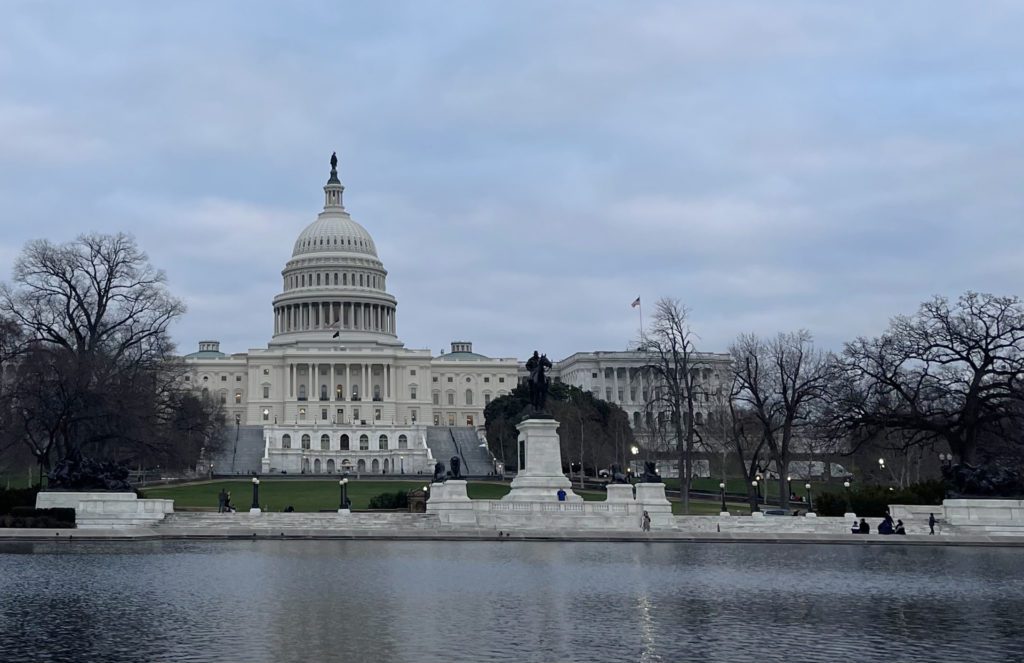
The Inflation Reduction Act (IRA) of 2022 also created the Methane Emissions Reduction Program (MERP), which aims to reduce methane emissions from the oil and gas sector. MERP establishes a Waste Emissions Charge (WEC) and revises greenhouse gas reporting requirements for the oil and gas sector, ensuring reported emissions are based on measured estimates. The WEC is a way of holding the largest polluters accountable for their pollution by levying a fee for excessive methane emissions. The WEC aims to work in tandem with the broader methane regulations; for example, operators that comply with methane regulations once they come into effect may be exempt from WEC fees.
Clean Air Council’s Involvement
Air pollution from the oil and gas industry affects everyone, especially frontline community members who are exposed to higher amounts of environment- and health-harming pollutants emitted by oil and gas infrastructure. The Council has worked with our members to prepare for public engagement opportunities. The EPA methane rule, for example, is the result of years of advocacy from the Council, our members, and our partners.
The methane rule, WEC, and the greenhouse gas reporting revision all involved a public engagement process that included a public hearing and comment period, among other opportunities. Clean Air Council supported member advocacy efforts by hosting educational webinars with partners and providing sample talking points and comments so members felt empowered to participate in the public engagement process. Most recently, the Council hosted a webinar on the WEC and supplied related comment materials.
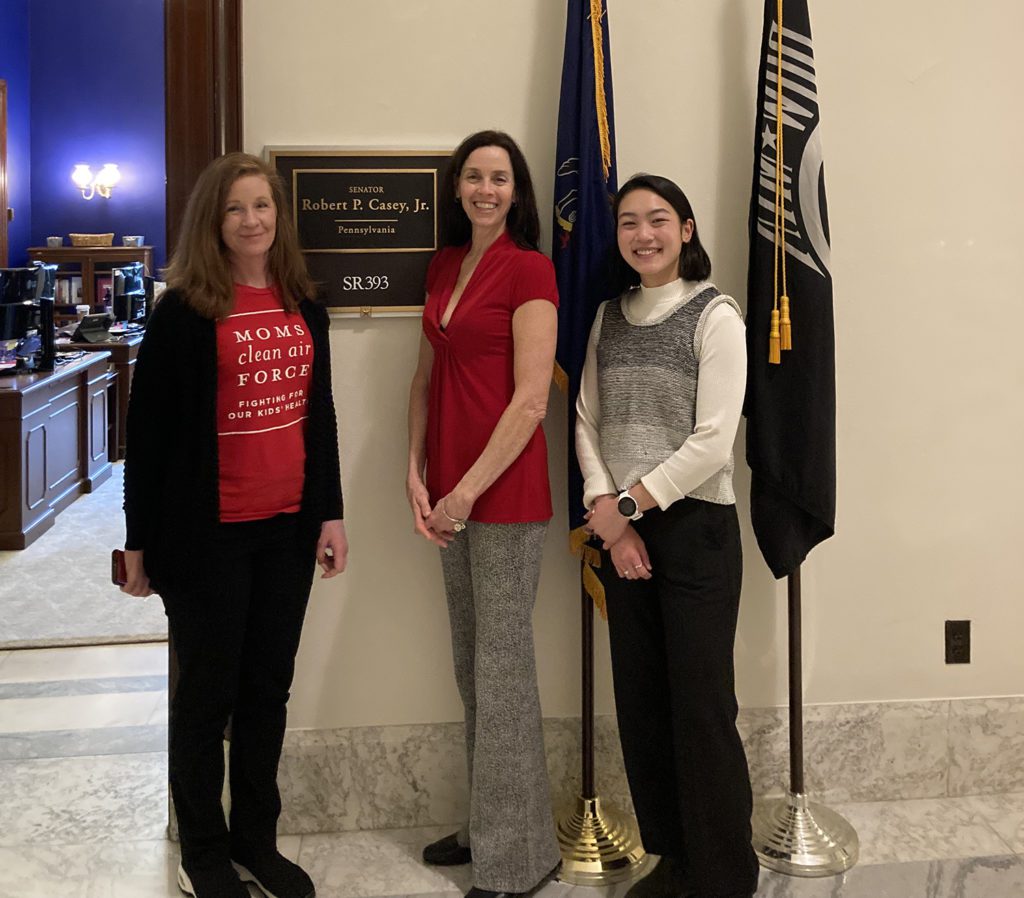
The Council has also engaged directly with elected officials to ensure they are knowledgeable about the rules and know what their constituents want. In March of 2024, staff traveled to Washington, D.C. to meet with Pennsylvania Senators Casey and Fetterman’s offices to discuss the benefits of the methane rule.
Work to ensure methane regulations are strong and protective does not end once a rule is finalized by the EPA. The EPA’s methane rule now enters the phase where each state determines how it will implement the rule via a State Implementation Plan (SIP), which the Pennsylvania Department of Environmental Protection (DEP) will need to draft and submit to the EPA. This is another opportunity for Pennsylvanians to speak up and ensure that the SIP is strong in protecting public health and the environment, as well as effective in rapidly reducing emissions.
Get involved
Even though some rules are finalized and various comment periods have closed, legislators still need to hear support for these policies from the people they represent. Members are always encouraged to contact their elected officials, at the state or federal level, to talk about why limiting methane is crucial. This support is especially important as bills continue to be introduced that would impact methane mitigation efforts. For example, House bill H.R. 1023 aims to effectively repeal MERP altogether. On the other hand, another recently-introduced bill would fund methane mitigation research. Ensuring that legislators know that their constituents care about meaningful methane reductions will protect these hard-fought regulations.
The ongoing SIP implementation of the methane rule will also create many opportunities in the near future for Pennsylvania residents to make their voice heard. Stay tuned for upcoming opportunities to show support for and influence an even stronger Pennsylvania-specific SIP that reduces as much methane as possible.
